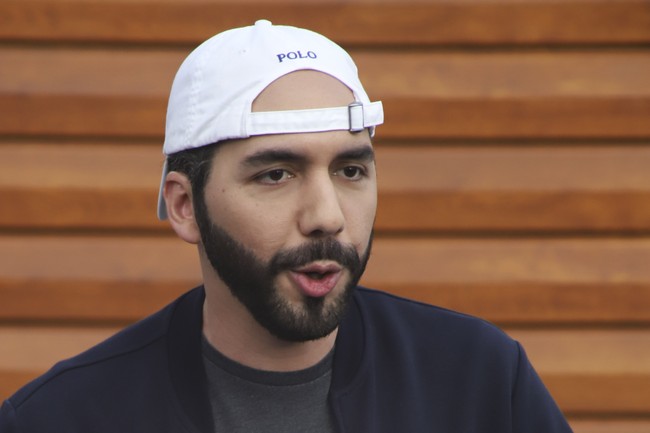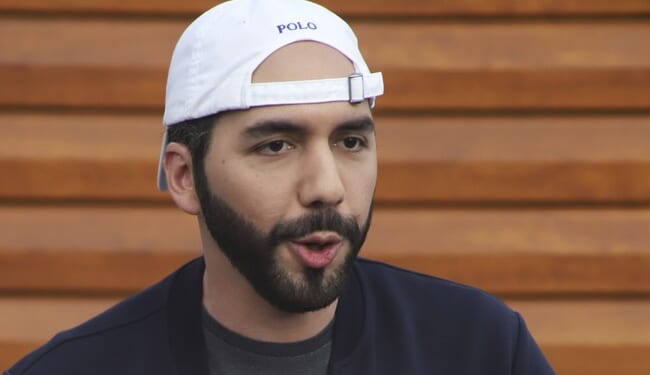
El Salvador gets ready to go to the polls for a historic election today as President Nayib Bukele is poised for one of the biggest landslide victories ever in a country with free elections. In the midst of this, the U.S. mainstream media and some government officials, including “Somalia First” Rep. Ilhan Omar, have threatened to take action to interfere with the election, as it appears they are angry that Bukele has been successful with his nationalistic policies in El Salvador that run counter to the globalist agenda.
Bukele first took power in 2019 after the country’s traditional right and left parties left a power vacuum that had been created by gang and drug trafficking. These gangs roamed El Salvador’s countryside, making it unsafe for even locals to travel outside of major cities. The infamous MS13 international gang ran rampant in El Salvador, with their leader recently captured by Mexico and extradited to the United States for trial.
The lack of leadership created one of the most dangerous environments in the world, with the western hemisphere’s highest murder rates per capita. When Bukele took office, he faced over 2,000 homicides in 2019 in a nation with a population of just over 6 million. As Bukele firmed his power with sweeping control of the legislature and El Salvador’s high courts, he was able to gain emergency powers to deploy the military to combat gang problems.
In 2022, Bukele performed a near-miraculous operation, wiping out three of El Salvador’s largest gangs in three days without tipping them off, resulting in zero retaliation. His government built a giant prison to house the gang members, with 76,000 people arrested in total to clean up the country.
Leftists in America cried about human rights and dictatorial powers as El Salvadorans could walk the streets of their country safely for the first time. In 2023, the homicide rate dropped to 2.4 per thousand, the lowest rate in the Americas. Now, many U.S. cities face levels similar to what El Salvador had during the worst of its gang problems.
Bukele didn’t only solve crime, he also built a thriving economy. He switched El Salvador’s currency to the dollar and bitcoin, encouraging international investment and tech business. Google announced a partnership last year, bringing jobs to the thriving Latin American country.
Infrastructure was another critical component of the Bukele agenda. New roads, highways, and a hydroelectric dam created clean energy for the people as the country worked itself out of poverty. Now, many tourists find El Salvador’s “Surf City” a rival to travel in the nicer areas of Costa Rica or Mexico.
Bukele faced challenges with this election, as El Salvador initially didn’t allow a president to hold successive terms, which created turmoil within the country as leadership would change every five years regardless of the people’s will. With the aid of the Supreme Court, Bukele changed the rules to allow himself to run again. When he made the rule change, El Salvadorans took to the streets to celebrate, as Bukele boasts over a 90% approval rating in the country.
In the United States, however, the mainstream media took to calling Bukele a “dictator.” Much like we’ve seen with how they treat President Trump, news outlets began calling Bukele running for re-election a “threat to democracy.”
This message was amplified this week by Rep. Ilhan Omar, who put in a resolution for the U.S. to intervene in El Salvador’s elections. She posted to X, “I led Members of Congress in sending a letter to @SecBlinken urging action on threats to democracy in El Salvador. The State Dept must review its relationship with El Salvador and defend democratic values. The Salvadoran people deserve free and fair elections without fear of repression.”
Her post was immediately met with a fact check from community notes, pointing out Bukele’s high approval rating in El Salvador and that he was elected in 2019 with zero claims of corruption in the results, unlike in the United States in 2020.
This time, Bukele is poised to have one of the greatest landslide victories in history. The major opposition parties combined may only get 15% of the vote if they have a good showing, with Bukele being so popular among the El Salvadoran people. The world watches, hoping that democracy can thrive and that the United States won’t interfere In these elections.












